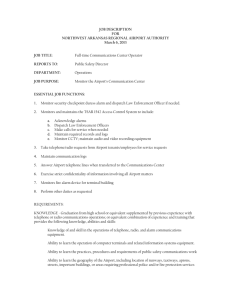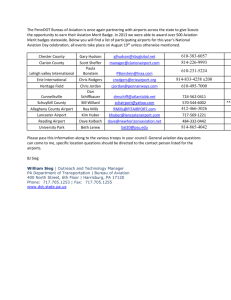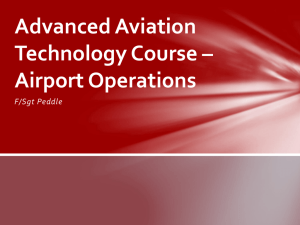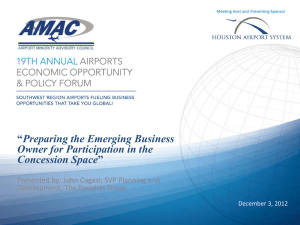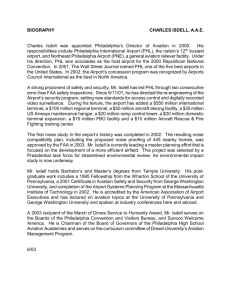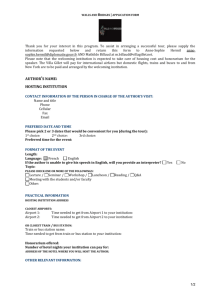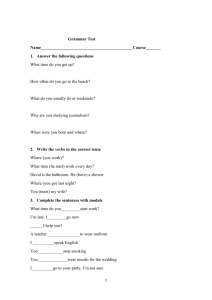AVM 2410 - Curriculum Services
advertisement
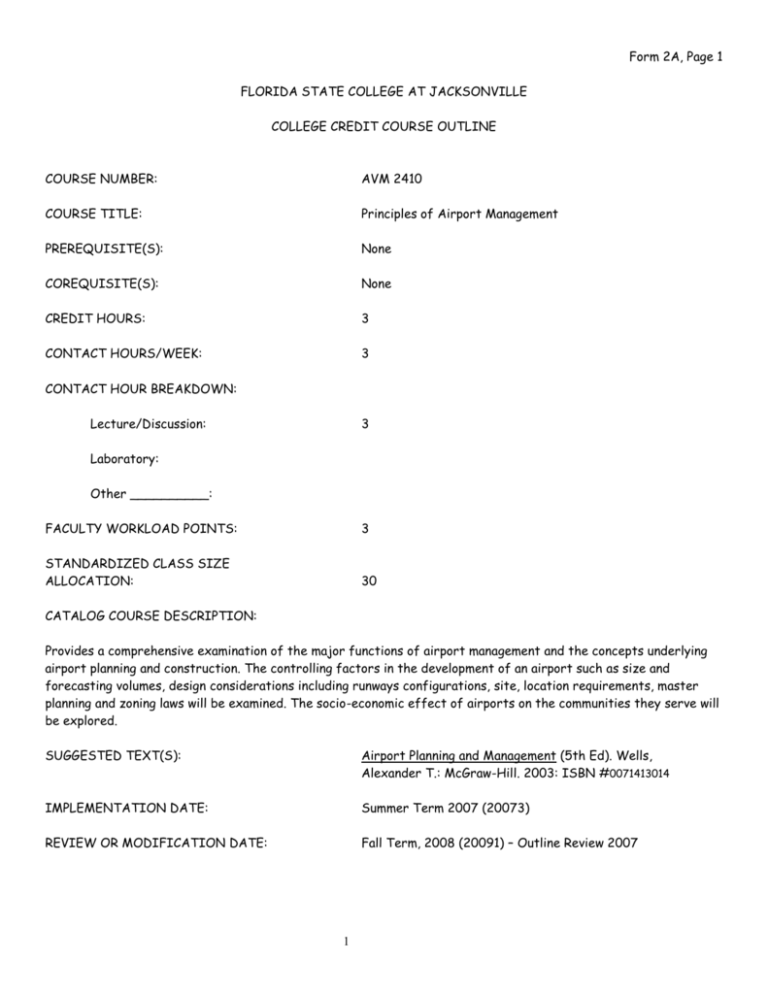
Form 2A, Page 1 FLORIDA STATE COLLEGE AT JACKSONVILLE COLLEGE CREDIT COURSE OUTLINE COURSE NUMBER: AVM 2410 COURSE TITLE: Principles of Airport Management PREREQUISITE(S): None COREQUISITE(S): None CREDIT HOURS: 3 CONTACT HOURS/WEEK: 3 CONTACT HOUR BREAKDOWN: Lecture/Discussion: 3 Laboratory: Other __________: FACULTY WORKLOAD POINTS: 3 STANDARDIZED CLASS SIZE ALLOCATION: 30 CATALOG COURSE DESCRIPTION: Provides a comprehensive examination of the major functions of airport management and the concepts underlying airport planning and construction. The controlling factors in the development of an airport such as size and forecasting volumes, design considerations including runways configurations, site, location requirements, master planning and zoning laws will be examined. The socio-economic effect of airports on the communities they serve will be explored. SUGGESTED TEXT(S): Airport Planning and Management (5th Ed). Wells, Alexander T.: McGraw-Hill. 2003: ISBN #0071413014 IMPLEMENTATION DATE: Summer Term 2007 (20073) REVIEW OR MODIFICATION DATE: Fall Term, 2008 (20091) – Outline Review 2007 1 Form 2A, Page 2 COURSE TOPICS CONTACT HOURS PER TOPIC I. The Airport-Airway System 3 II. The Airport System 3 III. Airport System Planning 3 IV. Airport Requirements and Site Selection 3 V. Airport Layout and Land Use Plans 3 VI. Terminal Area and Airport Access Plans 3 VII. Financial Planning 3 VIII. Airport Capacity and Delay 3 IX. Airside Technological Improvements 3 X. Landside Technological Improvements 3 XI. Financial Management 3 XII. Organization and Administration 3 XIII. Airport Operations 3 XIV. Airport Relations with Tenants and the Public 3 XV. Examinations 3 Total 45 2 Form 2A, Page 3 PROGRAM TITLE: Aviation Operations COURSE TITLE: Principles of Airport Management CIP NUMBER: 1649.010400 LIST PERFORMANCE STANDARD ADDRESSED: NUMBER(S): 05.0 TITLES(S): DEMONSTRATE UNDERSTANDING OF BUSINESS LAW AND MANAGEMENT PERTAINING TO AERONAUTICS – The student will be able to: 05.01 Describe and identify in what manner and under what conditions an airport may be exposed to a lawsuit. 05.02 Discuss the fundamental aspects of several categories of law that may affect the company because of its activities. 05.03 State the fundamental principles of torts, contracts, bailments, labor agency negligence, product liability, partnerships, and corporations. 05.04 Explain how an employee’s action or inaction may subject the aviation company or airport to a lawsuit involving one or more of the several categories of law. 07.0 DEMONSTRATE UNDERSTANDING OF AVIATION SAFETY, ACCIDENT PREVENTION AND INVESTIGATION – The student will be able to: 07.01 07.02 07.03 07.04 07.05 Describe and explain the complete regulation that is currently exercised by the Federal government in the field of safety and investigation. State and discuss the portion of the Federal Aviation Act of 1958 as amended, which is generally described as Title VI, Safety Regulations of Civil Aeronautics. Demonstrate knowledge of the minimum standards governing design, materials workmanship, performance of aircraft, inspection, servicing, overhaul of aircraft, and parts and appliances, equipment and facilities, as required by section 601 (a). Discuss the maximum hours of service for airmen and other employees, and other practices, methods, and procedures as required by Section 601 (a) of the Federal Aviation Act of 1958. Explain the Federal Aviation Regulations (FAR’s) promulgated by the Administrator to implement the authority granted by the Federal Aviation Act of 1958, in the area of safety, and to prevent accidents. 3 Form 2A, Page 4 PROGRAM TITLE: Professional Pilot Technology COURSE TITLE: Principles of Airport Management CIP NUMBER: 1649.010200 LIST PERFORMANCE STANDARD ADDRESSED: NUMBER(S): 03.0 UNDERSTAND AND EXPLAIN FEDERAL AVIATION ADMINISTRATION REGULATIONS – The student will be able to: 03.01 09.0 TITLES(S): Explain major portion of Parts 1, 61, 67, 91, 135, of the Federal Aviation Regulations and the reporting requirements of NTSB 830. DEMONSTRATE EFFECTIVE COMMUNICATION SKILLS – The student will be able to: 09.01 Write logical and understandable statements, or phrases, to accurately fill out forms/invoices commonly used in business and industry. 09.05 Read critically by recognizing assumptions and implications and by evaluating ideas. 09.07 Demonstrate knowledge and use of appropriate computer skills. 09.08 Demonstrate interpersonal skills. 4 Florida State College At Jacksonville Course Learning Outcomes & Assessment For All College Credit Courses NOTE: Use either the Tab key or mouse click to move from field to field. The box will expand to accommodate your entry. Section 1 COURSE PREFIX AND NUMBER: AVM 2410 SEMESTER CREDIT HOURS: 3 COURSE TITLE: Principles of Airport Management Section 2 TYPE OF COURSE: (Click on the box to check all that apply) AA Elective AS Required Professional Course College Prep AS Professional Elective AAS Required Professional Course Technical Certificate Other General Education: For General Education courses, you must also complete Section 3 and Section 7 Section 3 (If applicable) INDICATE BELOW THE DISCIPLINE AREA FOR GENERAL EDUCATION COURSES: Communication Social & Behavioral Sciences Mathematics Natural Sciences Humanities Section 4 INTELLECTUAL COMPETENCIES: Reading Speaking Writing Listening Critical Analysis Information Literacy Quantitative Skills Ethical Judgment Scientific Method of Inquiry Working Collaboratively Section 5 1 2 3 4 5 6 7 8 9 9 LEARNING OUTCOMES Demonstrate knowledge of the historical development of airports in the United States. Demonstrate knowledge of various legislation that impacts airports and discuss the importance of integrating airport planning from the federal, state and local levels to develop the airport system. Discuss various airport operation functions including pavement maintenance, snow removal, crash, fire and rescue and safety. Demonstrate understanding of factors that have an affect on the operations at airports Recognize issues and events that affect the management of airports Describe the classification of airports and their economic role as well as current issues facing the airport systems. Demonstrate knowledge of airport layout and land use plans in the airport master planning process. Recognize the major components that go into the overall operating and capital expenditure programs including revenue sources. List airport accounting systems and methods of financial management at commercial airports including pricing of airport facilities and services. Describe current airside and landside technological improvements designed to alleviate capacity and delay problems. Section 6 Name of Person Completing This Form: David Dagenais 5 METHOD OF ASSESSMENT Written testing Written testing Written testing Group project or indiviual term paper Local field trip to area airports or in-class guest speakers Written testing Written testing Written Testing Written Testing Written Testing
